A Case Study: Veronika Palovska on Niche Finding
Today I’m happy to share with you my interview with Veronika Palovska, the owner of DoYouSpeakFreedom.Com – a online English learning platform for female entrepreneurs.
I first interacted with Veronika when she enrolled in my LinkedEnglish courses. She then signed up for my newsletter, and has been one of my faithful subscribers, supporters and clients ever since.
At some point this year I noticed her fantastic content on twitter and decided to check out her website, which at the time was still being developed. What I loved about the website though is the domain name – doyouspeakfreedom.
Three things struck me:
- This is unique.
- It’s poetic (I’m a sucker for a good book, and just those words made me want to find out more about her programs).
- The name contains a message: learning English will make you free. We don’t learn English just for the sake of English. Generally people need English to feel free. Smart marketing.
When I received Veronika’s email about her website launch one phrase really inspired me, so much so that I couldn’t help sharing it in my Facebook group:
I’m learning a lot these days about letting go of perfectionism and embracing the messy reality of making things happen. Because that’s the only way to, well, make things happen, as opposed to just dreaming about them.
Unveiling the Website: What a Treat!
As I was browsing through her website I kept thinking, “What a brave woman.” It took me so many years to go from “help-everybody-who-comes-to-me” mindset to actually zeroing in on 1 thing that I’m most passionate about. Here was the courageous Veronika with her beautiful website, poetic copy, and attractive appeal to a specific group of people – female entrepreneurs. Wow.
Finding one’s niche is such a huge undertaking, and teachers spend months (and years – and rightly so) choosing, then narrowing down, then narrowing down again. Now I saw somebody who’s just beginning with so much definition and focus on her niche that it was scary (for me anyway).
[That’s one of the reasons why I kept hitting the wall with my services because for the longest time I tried to teach anybody who knocked on my door without finding my unique voice.]
So I wrote to Veronika,
“Congrats! Your website looks fabulous! I’m still navigating through this, but I’m loving the concept behind it, and your niche, too!”
I was both surprised and flattered to receive her unexpected response,
“Thank you for saying that about my website. It means a lot, because it was your book that has helped me define my niche, kill the overwhelm, and see it through. It’s a work in progress, but it’s not just a dream any more! “
That brought about even more questions, and hence is this interview – I hope you enjoy it ~ Elena.

When did you start working on your website and how long did it take you?
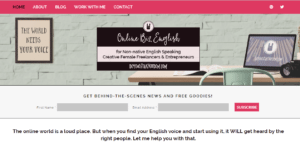 I started working on it at the end of February and it went live after about ten weeks. However, the website is just the tip of the iceberg – there had been a lot work before I even bought the domain and hosting.
I started working on it at the end of February and it went live after about ten weeks. However, the website is just the tip of the iceberg – there had been a lot work before I even bought the domain and hosting.
When I started building the website, I had already had a well-defined niche and a business plan. During those ten weeks, I worked on the copy, packages, branding, content plan and all the technical stuff.
During that time, I also grew my social media following. I went from zero to 900+ on Twitter, which may not be a huge number, but it brought some people on my email list before I even had a website. The list is very small, but it means everything to me: knowing that someone is interested in what I have to say is what holds me accountable and motivated when things get hard.
Were you tempted in the beginning to be “Jack-of-all-trades?” Why/why not? If so, how did you overcome this tendency to offer everything to everybody?
Being able to niche down was in fact one of the reasons why I decided to transition to teaching online. When I started thinking about it for the first time, my local tutoring business was going well. Clients kept coming through referrals, and my marketing was pretty much on autopilot.
But I felt there was no space for growing the business, and I couldn’t make more money without teaching more lessons. I also didn’t have any niche whatsoever – my clients were simply “people from this town”: all levels, all ages, and all kind of linguistic goals.
I knew that in order to evolve, I needed to go from “teaching English” to solving specific problems of specific people. So I needed to go online.
So no, I wasn’t tempted to offer everything to everyone, but it doesn’t mean the process of defining my niche was easy. But it was totally worth it: once I gave myself permission to say who I really wanted to work with, everything became easier: copywriting, branding, packaging my services, choosing the social media platforms, and everything else.
#niche down. Focus. Your business will be more effective. Learn more in this case study.Click To Tweet
Were you afraid to zero in on this particular niche? Why/why not?
Sure, having such a specific niche is scary. But I knew the niche very well and the question wasn’t if there are people who need my services, but how can I help them find me.
I believe that you need to have a strong message, because once the right person (your ideal client) stumbles upon it, it resonates with them; they remember you, trust you and are likely to invest their time and/or money in you.
But you also have to accept the fact that having a strong message and a specific niche means losing many potential clients and not being understood by everyone. It’s the price you pay for being a perfect fit and delivering outstanding results to very few people, as oppose to average results to many.
Why did you choose this particular niche?
I’m familiar with the world of creative online business, because I’m a freelance graphic designer myself. It’s been my passion for many years; I’m a teacher by day and a designer by night, and linking those two things together was a natural thing to do.
However, although it sounds so obvious today, it took me a relatively long time to decide on my niche. I had so many crazy ideas, while all the time the answer was right there in front of me. It was so close I couldn’t see it at first, but when I did, it was a huge relief, and it was so liberating.
How did “Opted Out of the Traditional Classroom” help you build your business?
Several months ago, when I started researching, the idea of transitioning online and creating a website seemed so overwhelming. Learning and building everything from scratch seemed like a never-ending chain of difficult tasks.
“Opted Out” helped me break through all the noise, concentrate on what really matters and take specific steps, one at a time, instead of thinking ten steps ahead about things that aren’t relevant at all.
What really helped me was that it’s not just a workbook or a guide; it’s a story about someone who went through it all, with actionable tasks you can implement right away and see the results.


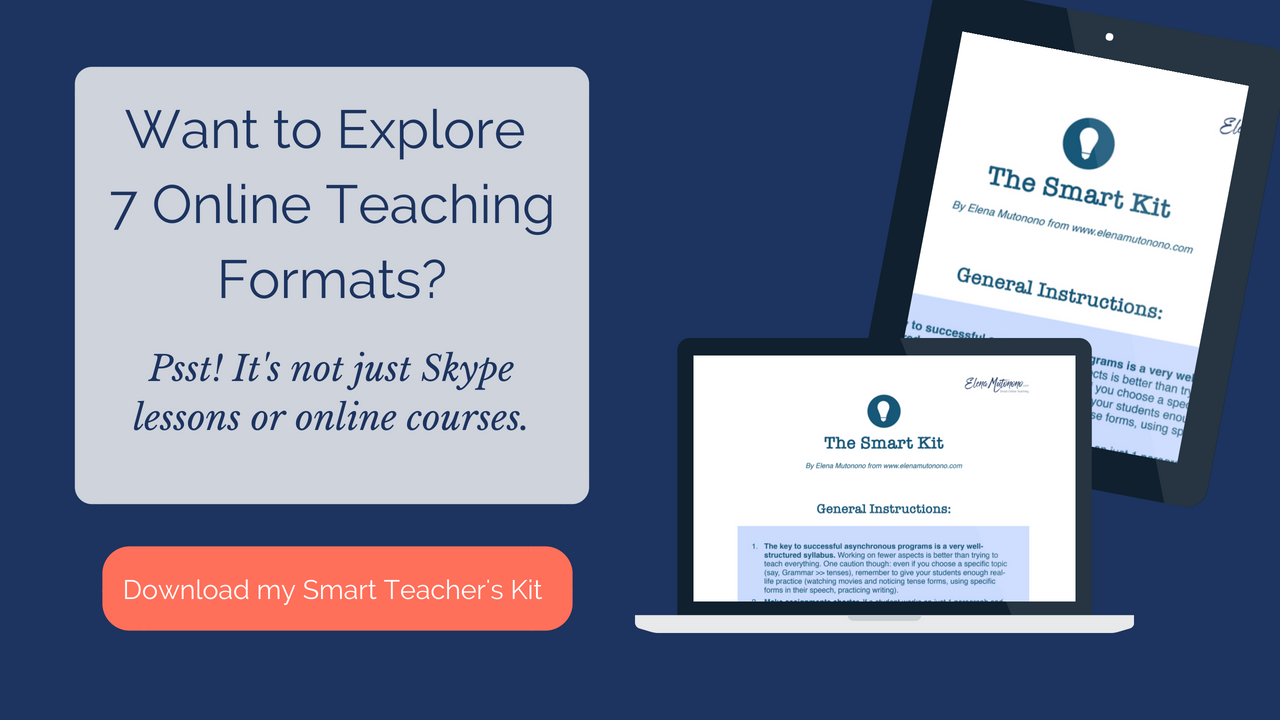
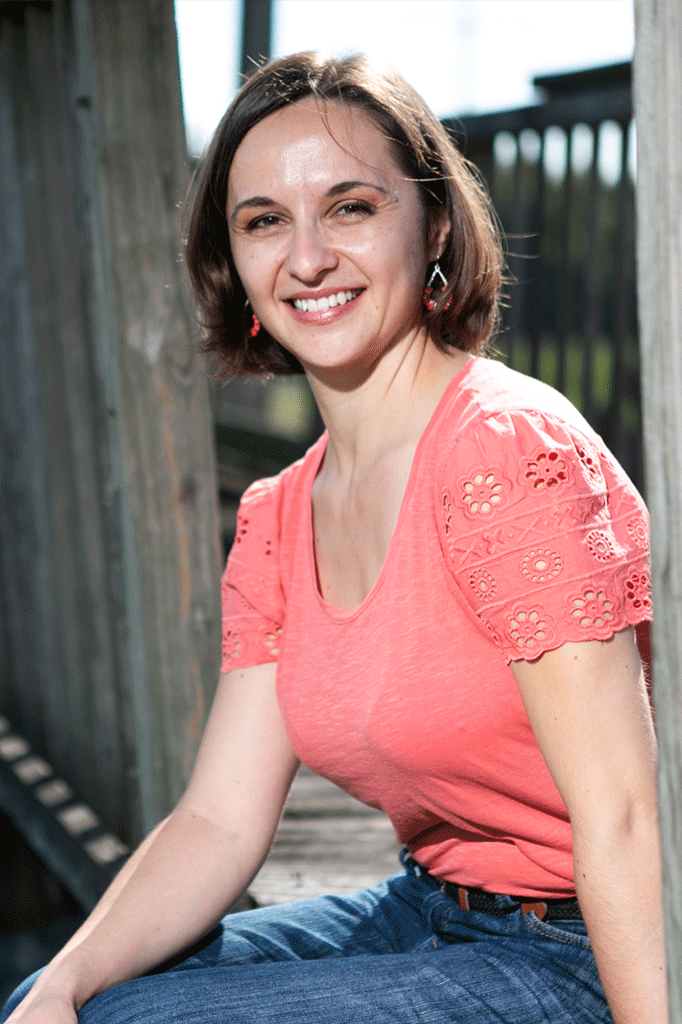 Welcome to my nook where *Big Magic* happens. My name is Elena Mutonono, I help small business owners package their services as digital products and sell them online. I want you to work smarter, not harder. Increase your impact beyond your current face-to-face clients. Grow your business as you reach more people all over the world.
Welcome to my nook where *Big Magic* happens. My name is Elena Mutonono, I help small business owners package their services as digital products and sell them online. I want you to work smarter, not harder. Increase your impact beyond your current face-to-face clients. Grow your business as you reach more people all over the world.
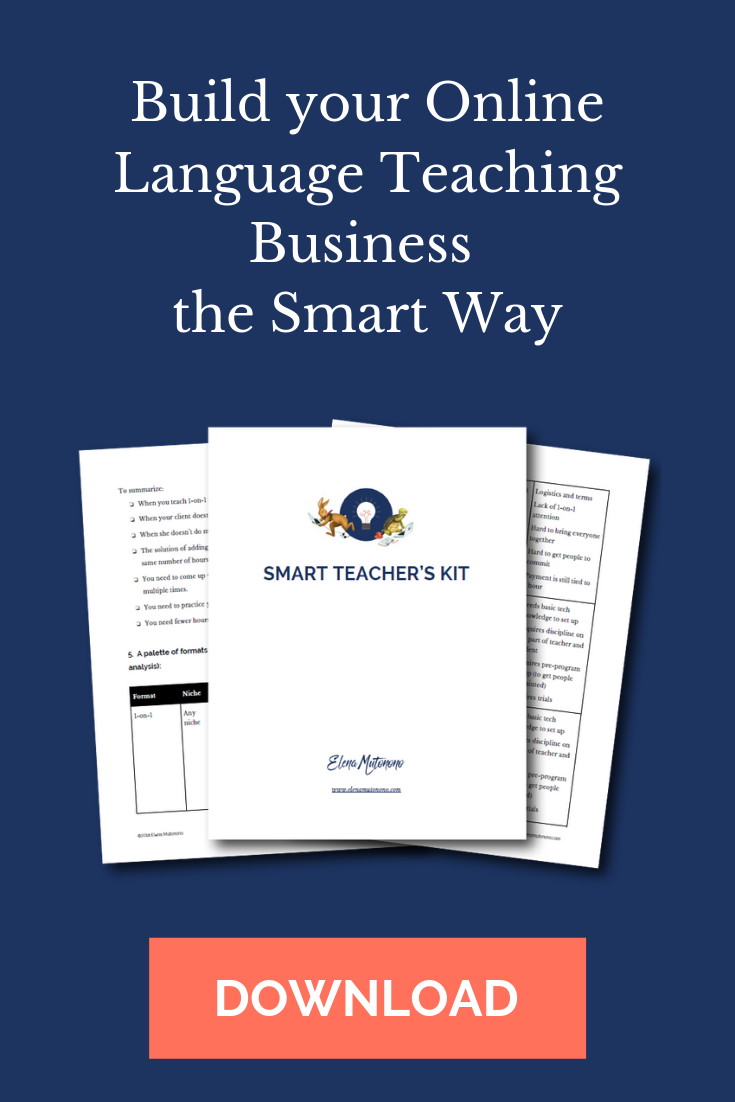


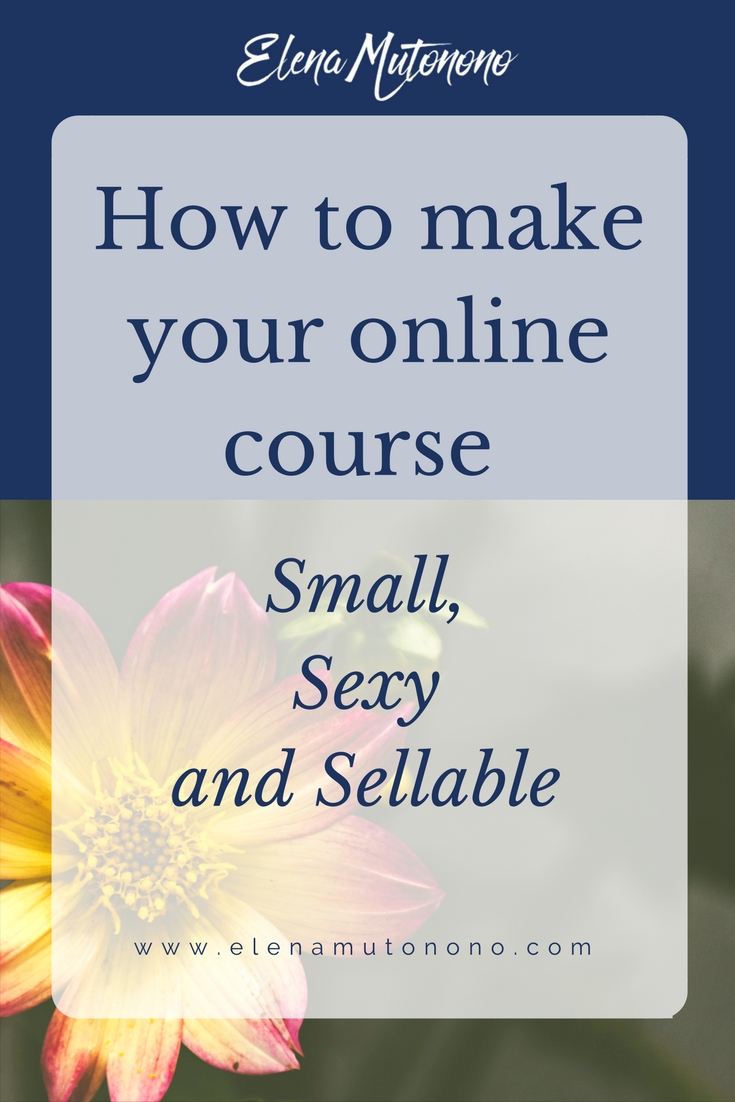


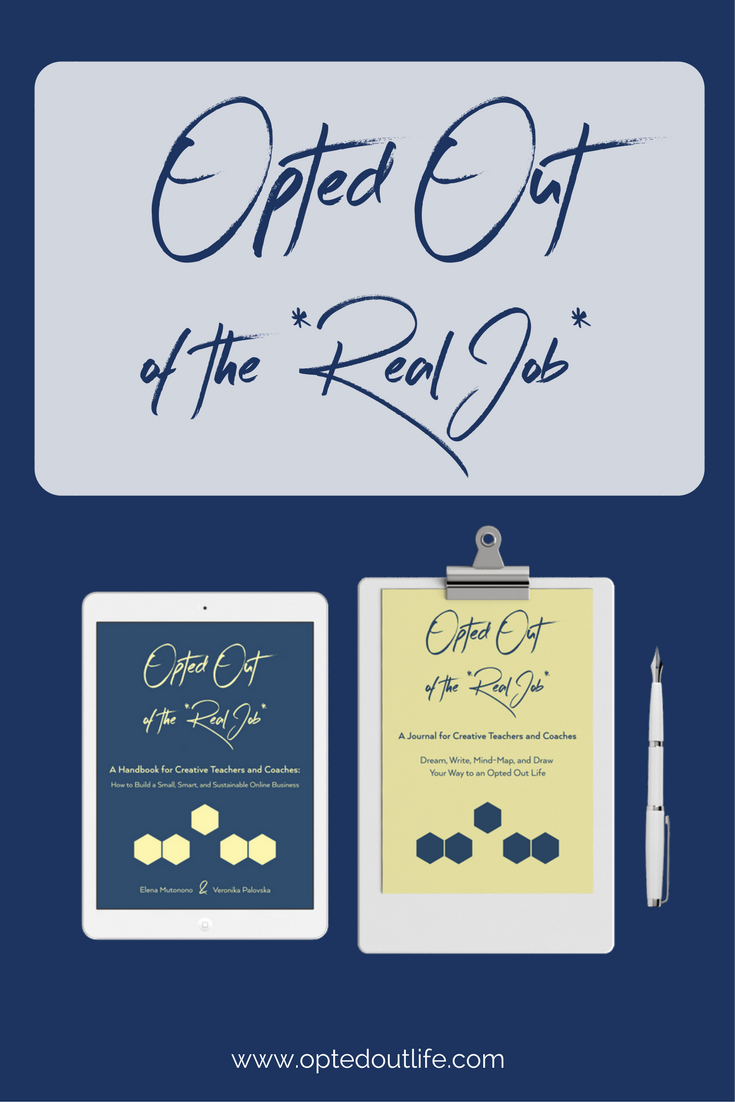

Hey ladies. Thanks for such an interesting and insightful article. Veronika’s story is really inspiring and the website is looking good. I was particularly intrigued by this section:
“During that time, I also grew my social media following. I went from zero to 900+ on Twitter, which may not be a huge number, but it brought some people on my email list before I even had a website.”
What sort of content were you posting on Twitter before you had a website? Other people’s presumably? Or did you have another strategy? I’m just wondering because it’s tricky to re-post your blog content before you have an actual website out there with a blog on it! At least that’s how it seems to me. It would be good to know how Veronika approached this. Thanks!
Yes, that’s a good question. I just sent it to Veronika, and she’ll respond shortly.
Hi Cara! Great question, thank you.
I mostly posted links to resources that could be helpful or interesting for female entrepreneurs, both my potential clients (non-native English speaking creative freelancers & entrepreneurs) and my peers (online teachers and other online entrepreneurs), along with my own thoughts and comments.
I also followed and interacted with people from the two groups – retweeted their content, answered questions, or reached out through private messaging. This can’t be automated, but it’s worth the time and effort.
I sometimes posted things that had nothing to do with English or online business, but were still in accordance with my brand message. These posts tended to get a lot of attention as well.
My bio linked to a coming soon page with a signup form.
Hope this answers your question. I very much appreciate that you took the time to read the post. Thank you!
I think it’s very important to re-post/re-share other people’s materials. It gives people a good vibe about you and makes them want to do the same for you when you ask them to RT. I see most engagement on my posts when I re-share somebody else’s materials (relevant to my brand and my niche and my followers, of course). I think connecting with people on a personal level is essential. In fact, I make it a point to connect with up to 5 people a week on a personal level and invite them to check out my content that I think they might be interested in. I mainly do that on LinkedIn though, but I’ve done it on twitter as well.
Yes, I’ve realized that from reading your thoughts on that. I had always thought that social media was mainly another way of promoting our own content and therefore didn’t make sense until we had a website. You should add something about waiting list email optins to the EELB course-I’m kicking myself for only just learning about it now, especially since my website has been in “coming soon” mode for several weeks!
Do you mean I should add a waiting list for those who want to join Express Email List Builder but can’t at the moment? I recently added that button to the page, I hope that’s what you meant.
Hi Elena. Sorry I wasn’t clear. I thought it would be interesting to show people in the course how to add a sign-up form to a coming soon page so they can start list building that way. But the social media strategy that Veronika used before getting her website up is actually much more enlightening, even though it didn’t enable that much list building!
Hi Veronika. I’ve only just seen this. I must have forgotten to subscribe to the comments. Thanks for replying anyway. That’s a great way to build a following without a website. I’ve really missed a trick here because I decided that it wasn’t really worth building a social media following until I had a website. I didn’t realise that you could add a waiting list e-mail option. Were you able to build up a decent sized email list this way? I’m launching very soon so I think I’ll just have to accept that I’ve perhaps done things the wrong way round. Nevermind! Glad to hear it worked out well for you!
I wouldn’t say it was a “decent sized” list if we talk about numbers. But I was extremely grateful for the handful of people who have subscribed.
I must admit that I didn’t take full advantage of the coming soon page (that’s where the sign-up form for my email list was). I didn’t actively promote it, I just linked to it in my Twitter bio. And I didn’t offer anything in return apart from updates about the launch.
If you want to grow your list, you have to tell people about it on social media and give them a reason. Some people offer an opt-in gift (like an e-book) before they have a website, and they are successful. But like I said, I didn’t; my priority was to finish and launch the website. Now I’m going to concentrate on the list.
Cara, I wish you good luck with your launch and I hope you will let us know in the Facebook group.
Hi again. Thanks for sharing your story. I don’t think “size matters” as it were as regards this list. I just think it’s nice that you were able to make use of the “coming soon” page and link that to your list. I’m sure your efforts on Twitter to interact with potential students and peers were probably much more fruitful, especially because you were replying to individuals directly. In any case, thanks to Elena’s EELB course, I’ve got my free product more or less ready (so I could try to promote it on SM) and I’m obviously learning more than I could have imagined about list building! I agree with you though, getting the website done is the most important thing and there is a lot to think about with regard to that! Of course I will update the group – you guys are my lifeline!